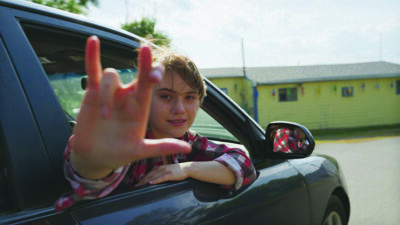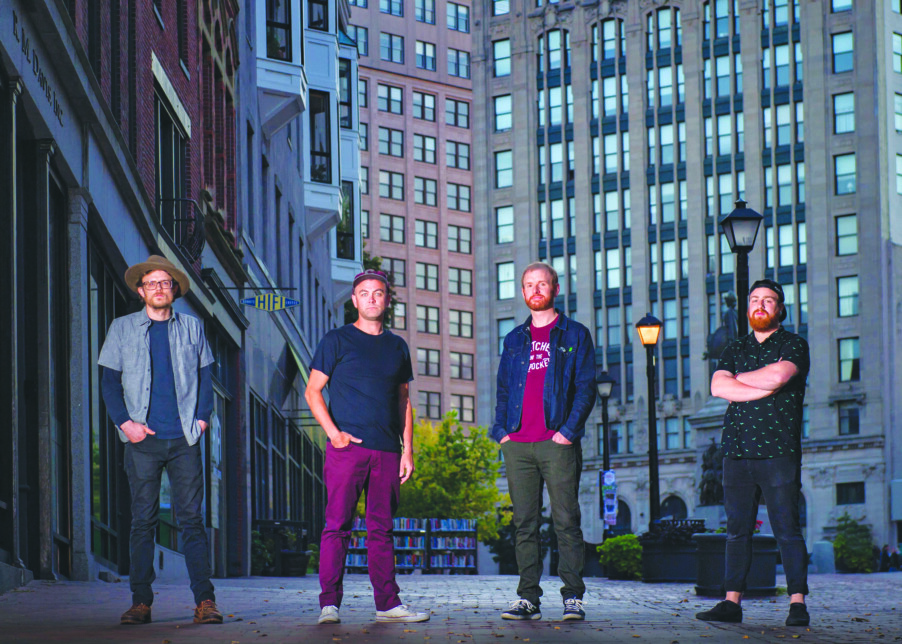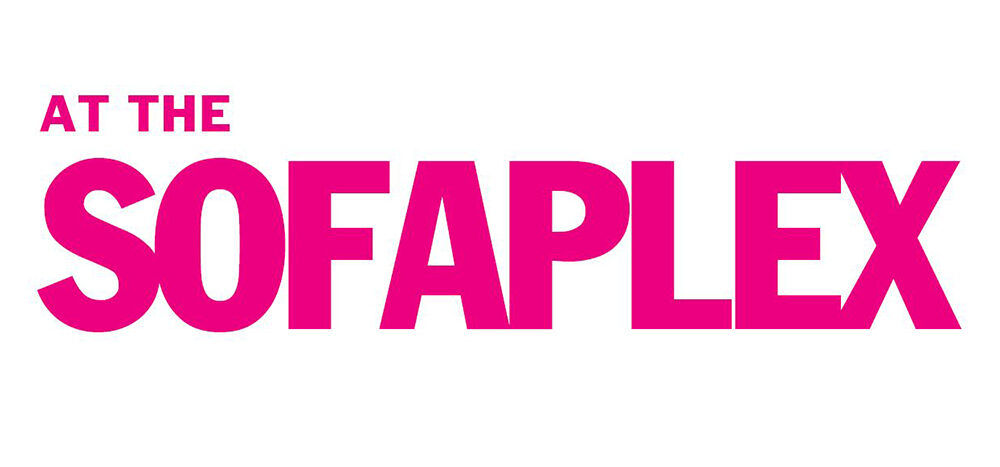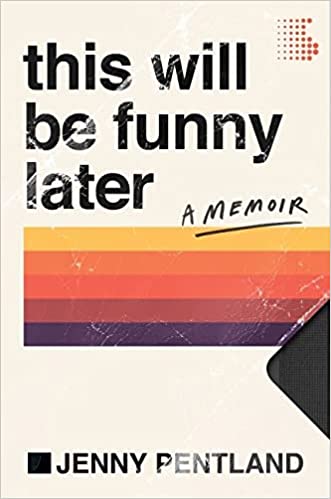This Will Be Funny Later, by Jenny Pentland (Harper, 341 pages)
You may not have heard of Jenny Pentland, but you’ve probably heard of her mother, an actress and comedian by the name of Roseanne Barr. Barr was the star of the eponymous sitcom that aired on ABC for nine years in the ’80s and ’90s, and I have to confess before we start that I’m not sure I ever watched an episode in its entirety.
As such, I’m not much impressed by the fact that Pentland and her siblings — indeed, her entire family — were the models for the messy TV family known to Americans as the Conners. (In addition to Barr, the show made John Goodman, her TV husband, a household name.)
Truth be told, I’m not much impressed by anything that comes out of Hollywood lately.
That said, Pentland has emerged from relative obscurity to write a surprisingly interesting book that doesn’t demand binge-watching Roseanne as a prerequisite.
It is intelligent and scathing, indicting and forgiving, bitter and loving, a large dose of acid with just the right amount of sweet. Pentland’s childhood was, in effect, kind of horrible by all objective standards, meaning the standards of Child Protective Services — and that was before her mom became famous. “Aside from being half-naked and feral, we were also being raised part atheist, part Jewish and part Wiccan, with a touch of paganism and voodoo thrown in.” For years, the family struggled, graduating from trailers to an apartment to a 500-square-foot bungalow. “We may have been climbing the ladder, but we were still on the lower rungs,” she writes. “We could afford name-brand foods now, but we couldn’t afford to spill them. We still had to make our frivolous purchases, like toys, from other people’s lawns.”
Her dad was a trash collector before he became a mail sorter; her mother struggled to assimilate her creative ambitions with the day-to-day drudgery of having three young children in diapers. Meanwhile, Pentland herself showed signs of a comedic streak even as a child: Her growing collection of dolls, some scavenged by her father from other people’s trash, always had something wrong with them, so she took to diagnosing them with various illnesses — polio, sickle cell anemia, debilitating autoimmune diseases. She even made crutches out of pencils for one of the dolls. Yes, a social worker seeing this would have intervened, but in retrospect, since Pentland turned out OK, it’s wicked good black humor.
Humor got scarcer in adolescence. After her mother discovered her talent at making people laugh at open-mic nights, she began spending less time tending to her children and more time tending her career, and Pentland’s weight started to become an issue; like mother, like daughter. (She says her mother once lost a lot of weight with a diet that allowed her one doughnut and one ice cream cone a day, and nothing else.) Barr would be traveling and come home to find out that everyone had gained five pounds from eating fast food. Then they’d all go on a fad diet. Visits to her grandparents’ “house/feedlot” didn’t help. No surprise, Pentland developed an eating disorder that found her at times eating spoonfuls of granulated sugar or plain pats of butter. At one point, to try to keep their children from eating, the parents literally put a padlock on the refrigerator.
Meanwhile, the relationship between Barr and Pentland’s father was catastrophically unraveling, even as Barr’s star was ascending. When they finally got divorced, he lost not only his kids, but his job writing for the TV show. Pentland and her siblings had to deal with all the ordinary fallout from a family disintegrating, while also dealing with reporters and photographers stalking the family. Then Barr got involved with Tom Arnold, a man 10 years younger than she was, and their lives got even messier.
Through her teen years, Pentland was shuttled from weight-loss camps to wilderness survival programs, some of which have now been described as child abuse. At the start of one, participants were given a can of peaches each, but no way to open them. (The staff just watched as the teens tried to smash them.) In the next phase, they were given nothing to eat but raisins, peanuts, raw cornmeal and beans to eat. She writes of being covered with blisters and mosquito bites, and having to spend a night in the woods by herself. She was 15. Later, when she was done with all that, there were the classes at the Scientology Center.
It is much like driving past a car wreck, only in this book we are invited to look at the horror. What is most amazing about this story is that somehow, inexplicably, it seems to end well. Despite a train-wreck of a childhood and adolescence, Pentland turned out amazingly well. She is now the mother of five (none of whom have polio) and she lives a seemingly idyllic life on a farm in Hawaii. Moreover, her relationship with her mother is confoundingly good. She recently told People magazine, “We communicate at all costs. Even if it’s uncomfortable, annoying or the timing is bad, that’s the priority.”
It is unclear how such a good relationship could have emerged out of what came before, and I still have zero desire to watch Roseanne, but This Will Be Funny Later succeeds as a thoughtful and provocative memoir, even it’s title isn’t always true. A
Book Notes
In February, a young man’s fancy lightly turns to thoughts of strangling the infernal groundhog.
Winter will be with us for a few more weeks, although there are those who say it won’t be with us in a few more centuries. Porter Fox, for example, asks us to consider The Last Winter (Little Brown & Co., 320 pages), his examination of “the scientists, adventurers, journeymen and mavericks trying to save the world” from climate change.
A former fellow at MacDowell, the artists’ colony in Peterborough, Fox grew up on the coast of Maine and has previously written about skiing and the future of snow, so he’s not new to the topic. Depending on how cold you are right now, this might be a dystopian book, or one of hope.
Continuing the theme, poetry fans will want to check out Winter Recipes from the Collective (Farrar, Straus & Giroux, 64 pages) from Louise Glück, an underachiever who has won both a Nobel Prize for literature and a National Book Award and has also been the U.S. poet laureate.
If you prefer short stories, there’s Lily King’s Five Tuesdays in Winter (Grove Press, 240 pages), of which Ann Patchett said, “It filled up every chamber of my heart.”
Skiers will like Winter’s Children, A Celebration of Nordic Skiing (University of Minnesota Press, 448 pages), by Ryan Rodgers, even though it’s mostly about skiing in the Midwest.
And worth dipping back to the past is Winter World: The Ingenuity of Animal Survival (Ecco, 368 pages), which was published in 2003 but is an evergreen discourse on how animals survive through New England winters. It’s by biologist Bernd Heinrich, a professor emeritus at the University of Vermont.
Book Events
Author events
• ERIK LARSON Author presents The Splendid and the Vile. The Music Hall Historic Theater, 28 Chestnut St., Portsmouth. Wed., Feb. 16, 7 p.m. Tickets cost $13.75. Visit themusichall.org or call 436-2400.
• GARY SAMPSON AND INEZ MCDERMOTT Photographer Sampson and art historian McDermott discuss New Hampshire Now: A Photographic Diary of Life in the Granite State. Sat., Feb. 19, 9:45 to 11:45 a.m. Peterborough Town Library, 2 Concord St., Peterborough. Visit monadnockwriters.org.
• HOWARD MANSFIELD Author presents Chasing Eden. Sat., March 19, 9:45 to 11:45 a.m. Peterborough Town Library, 2 Concord St., Peterborough. Visit monadnockwriters.org.
• BECKY SAKELLERIOU AND HENRY WALTERS Becky Sakelleriou presents The Possibility of Red. Henry Walters presents Field Guide A Tempo. Sat., April 16, 9:45 to 11:45 a.m. Peterborough Town Library, 2 Concord St., Peterborough. Visit monadnockwriters.org.
Poetry
• REBECCA KAISER Poet presents Girl as Birch. Virtual event hosted by Gibson’s Bookstore in Concord. Mon., April 11, 7 p.m. Via Zoom. Registration required. Visit gibsonsbookstore.com or call 224-0562.
• DOWN CELLAR POETRY SALON Poetry event series presented by the Poetry Society of New Hampshire. Monthly. First Sunday. Visit poetrysocietynh.wordpress.com.
Book Clubs
• BOOKERY Online. Monthly. Third Thursday, 6 p.m. Bookstore based in Manchester. Visit bookerymht.com/online-book-club or call 836-6600.
• GIBSON’S BOOKSTORE Online, via Zoom. Monthly. First Monday, 5:30 p.m. Bookstore based in Concord. Visit gibsonsbookstore.com/gibsons-book-club-2020-2021 or call 224-0562.
• TO SHARE BREWING CO. 720 Union St., Manchester. Monthly. Second Thursday, 6 p.m. RSVP required. Visit tosharebrewing.com or call 836-6947.
• GOFFSTOWN PUBLIC LIBRARY 2 High St., Goffstown. Monthly. Third Wednesday, 1:30 p.m. Call 497-2102, email elizabethw@goffstownlibrary.com or visit goffstownlibrary.com
• BELKNAP MILL Online. Monthly. Last Wednesday, 6 p.m. Based in Laconia. Email bookclub@belknapmill.org.
• NASHUA PUBLIC LIBRARY Online. Monthly. Second Friday, 3 p.m. Call 589-4611, email information@nashualibrary.org or visit nashualibrary.org.






